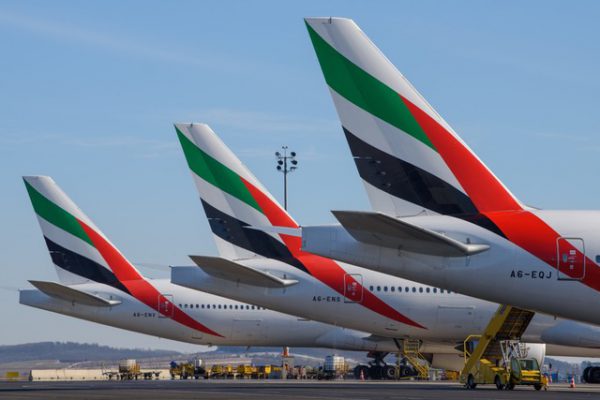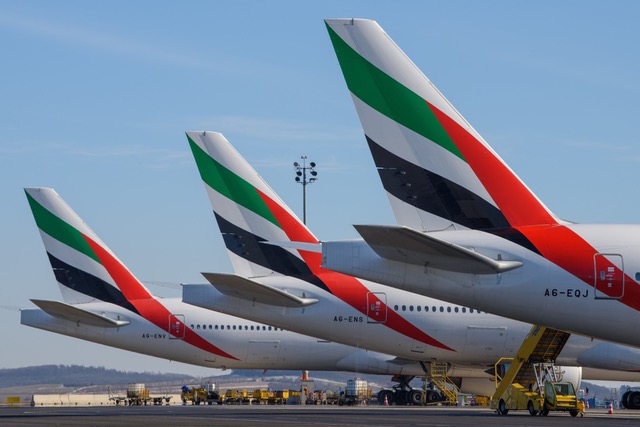DUBAI, UAE, 16 June 2021: Emirates Group announced on Tuesday its first annual loss in over 30 years caused by a significant drop in revenue, fully attributed to the impact of Covid-19 related flight and travel restrictions throughout its entire financial year 2020-21.
The airline’s 2020-21 Annual Report shows the Emirates Group posted a loss of AED22.1 billion (USD 6.0 billion) for the financial year ended 31 March 2021 compared with an AED1.7 billion (USD456 million) profit for last year. The group’s revenue was AED35.6 billion (USD9.7 billion), a decline of 66% over last year’s results. The group’s cash balance was AED19.8 billion (USD5.4 billion), down 23% from last year, mainly due to weak demand caused by the various pandemic related business and travel restrictions across all of the group’s core business divisions and markets.

Emirates Airline and Group chairman and chief executive Sheikh Ahmed bin Saeed Al Maktoum said: “The Covis-19 pandemic continues to take a tremendous toll on human lives, communities, economies, and on the aviation and travel industry. In 2020-21, Emirates and dnata were hit hard by the drop in demand for international air travel as countries closed their borders and imposed stringent travel restrictions.
“Our top priorities throughout the year were: the health and wellbeing of our people and customers, preserving cash and controlling costs, and restoring our operations safely and sustainably. Emirates received a capital injection of AED11.3 billion (USD3.1 billion) from our ultimate shareholder, the Government of Dubai, and dnata tapped on various industry support programmes and availed a total relief of nearly AED 800 million in 2020-21. These helped us sustain operations and retain the vast majority of our talent pool. Unfortunately, we still had to make the difficult decision to resize our workforce in line with reduced operational requirements.”
For the first time in the group’s history, redundancies were implemented across all parts of the business. As a result, the group’s workforce reduced by 31% to 75,145 employees, representing over 160 different nationalities.
Sheikh Ahmed added: “No one knows when the pandemic will be over, but we know recovery will be patchy. Economies and companies that entered pandemic times in a strong position will be better placed to bounce back. Until 2020-21, Emirates and dnata have had a track record of growth and profitability, based on solid business models, steady investments in capability and infrastructure, a strong drive for innovation, and a deep talent pool led by a stable leadership team. These fundamental ingredients of our success remain unchanged. Together with Dubai’s undiminished ambitions to grow economic activity and build a city for the future, I am confident that Emirates and dnata will recover and be stronger than before.”
Emirates performance
Emirates’ total passenger and cargo capacity declined by 58% to 24.8 billion ATKMs at the end of 2020-21, due to pandemic related flight and travel restrictions, including a complete suspension of commercial passenger services for nearly eight weeks as directed by the UAE government from 25 March 2020.
Emirates received three new A380 aircraft during the financial year and phased out 14 older aircraft comprising of nine Boeing 777-300ERs and five A380s, leaving its fleet count at 259 at the end of March. Emirates’ average fleet age remains at 7.3 years. Emirates’ order book for 200 aircraft remains unchanged at this time.
Emirates gradually restored its passenger network and hub connectivity from mid-June 2020 as the UAE re-opened for transit travellers and later for international arrivals.
During the year, Emirates reactivated its strategic codeshare partnership with flydubai, and entered into agreements with new partners TAP Air Portugal, FlySafair, and Airlink in South Africa, to expand connectivity for its customers.
From zero scheduled passenger flights at the start of the financial year to operations in over 120 destinations by 31 March 2021, Emirates has shown its ability to adapt and respond to challenges and the resilience of its people and business model.
With significantly reduced and constrained capacity deployment across most markets, Emirates’ total revenue for the financial year declined 66% to AED 30.9 billion (US$ 8.4 billion). Currency fluctuations this year had no significant impact on airline revenue.
Total operating costs decreased by 46% from the last financial year. Cost of ownership (depreciation and amortisation) and employee cost were the two biggest cost components for the airline in 2020-21, followed by fuel, which accounted for 14% of operating costs compared to 31% in 2019-20. The airline’s fuel bill declined by 76% to AED6.4 billion (USD1.7 billion) compared to the previous year, driven primarily by a 69% lower uplift in line with capacity reduction.
Due to ongoing pandemic-related flight and travel restrictions, the airline reported a loss of AED 20.3 billion (US$ 5.5 billion) after last year’s AED1.1 billion (USD288 million) profit and a negative profit margin of 65.6%. This includes a one-time impairment charge of AED710 million (USD193 million), mainly relating to certain aircraft currently grounded and are not expected to return to service before their scheduled retirement within the next financial year.
Emirates carried 6.6 million passengers (down 88%) in 2020-21, with seat capacity down by 83%. The airline reports a Passenger Seat Factor of 44.3%, compared with last year’s passenger seat factor of 78.5%; and a 48% increase in passenger yield to 38.9 fils (10.6 US cents) per Revenue Passenger Kilometre (RPKM), due largely to a favourable route mix, fares and continued healthy demand for premium seats. Seat load factor and yield results cannot be compared against the previous year’s performance due to the unusual pandemic situation.
Emirates closed the financial year with cash assets of AED15.1 billion (USD4.1 billion), a position which would have stronger if not for a one-time payout of AED8.5 billion for customer refunds.
The full 2020-21 Annual Report of the Emirates Group – comprising Emirates, dnata and their subsidiaries – is available at: www.theemiratesgroup.com/annualreport







